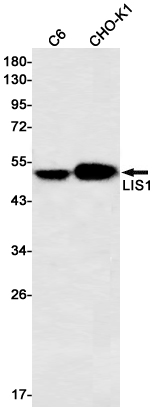-
Product Name
Anti-LIS1 Rabbit antibody
- Documents
-
Description
LIS1 Rabbit monoclonal antibody
-
Tested applications
WB, FC, IP
-
Species reactivity
Human, Mouse, Rat
-
Alternative names
MDS; LIS1; LIS2; MDCR; NudF; PAFAH antibody
-
Isotype
Rabbit IgG
-
Preparation
Antigen: A synthetic peptide of human LIS1
-
Clonality
Monoclonal
-
Formulation
50nM Tris-Glycine(pH 7.4), 0.15M Nacl, 40%Glycerol, 0.01% sodium azide and 0.05% BSA.
-
Storage instructions
Store at 4°C short term. Store at -20°C long term. Avoid freeze / thaw cycle.
-
Applications
WB: 1/1000-1/5000
FC: 1/100-1/500
IP: 1/20
-
Validations

Western blot detection of LIS1 in C6,CHO-K1 cell lysates using LIS1 Rabbit mAb(1:500 diluted).Predicted band size:47kDa.Observed band size:47kDa.
-
Background
Swiss-Prot Acc.P43034.Required for proper activation of Rho GTPases and actin polymerization at the leading edge of locomoting cerebellar neurons and postmigratory hippocampal neurons in response to calcium influx triggered via NMDA receptors. Non-catalytic subunit of an acetylhydrolase complex which inactivates platelet-activating factor (PAF) by removing the acetyl group at the SN-2 position . Positively regulates the activity of the minus-end directed microtubule motor protein dynein. May enhance dynein-mediated microtubule sliding by targeting dynein to the microtubule plus end. Required for several dynein- and microtubule-dependent processes such as the maintenance of Golgi integrity, the peripheral transport of microtubule fragments and the coupling of the nucleus and centrosome. Required during brain development for the proliferation of neuronal precursors and the migration of newly formed neurons from the ventricular/subventricular zone toward the cortical plate. Neuronal migration involves a process called nucleokinesis, whereby migrating cells extend an anterior process into which the nucleus subsequently translocates. During nucleokinesis dynein at the nuclear surface may translocate the nucleus towards the centrosome by exerting force on centrosomal microtubules. May also play a role in other forms of cell locomotion including the migration of fibroblasts during wound healing. Required for dynein recruitment to microtubule plus ends and BICD2-bound cargos (PubMed:22956769).
Related Products / Services
Please note: All products are "FOR RESEARCH USE ONLY AND ARE NOT INTENDED FOR DIAGNOSTIC OR THERAPEUTIC USE"
